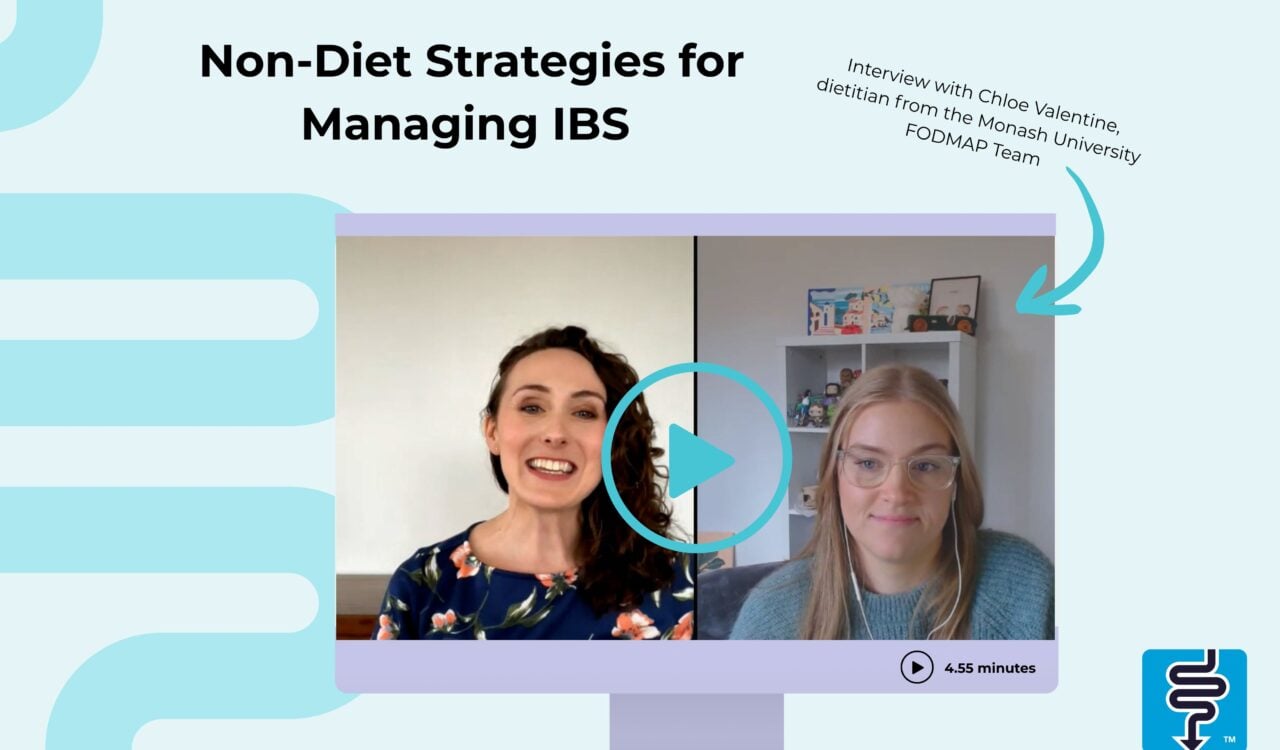Managing irritable bowel syndrome (IBS) isn’t just about what you eat. While the low FODMAP diet can play an important role in easing gut symptoms, your daily habits and routines also matter. Simple lifestyle changes can support digestion, reduce bloating and ease unpleasant gut symptoms.
We asked Chloe Valentine, a research dietitian from the Monash University FODMAP team, to share five non-diet strategies that can make a real difference to IBS symptoms.
- Prioritise Restful Sleep
Studies show that people who reported sleep disturbances also reported that their gut symptoms were worse. This suggests that improving sleep quality might also help improve gut symptoms. We know that poor sleep quality can increase pain sensitivity and heighten stress, which could make gut flare-ups more likely.
Here are some tips to improve sleep:
- Keep a consistent bedtime and wake-up time
- Limit caffeine and large meals before bed
- Reduce screen time for at least an hour before sleep
Building a calming bedtime routine helps your body release sleep hormones and gives your body a chance to rest and repair overnight.
- Move Your Body Regularly
Gentle to moderate movement can ease IBS symptoms in several ways. Physical activity helps food move smoothly through your digestive system, supports regular bowel movements and releases endorphins (happy hormones) that lower stress levels.
You don’t need to run marathons or go to a HITT class. Light activity, such as walking, swimming, cycling or yoga is enough to help your gut. Even incidental movement, such as gardening, cleaning, or playing with your kids, also counts and helps get you moving without having to set aside time for an ‘exercise moment’. Yoga or stretching is especially helpful for releasing trapped gas and reducing bloating.
- Support Your Brain-Gut Connection
The gut and brain are constantly communicating, which means stress and anxiety can directly affect your gut. If you’re experiencing bad gut symptoms, it can cause stress and anxiety. If you’re stressed and anxious, it can cause gut symptoms. This can create a symptom loop.
Therapies that focus on the brain-gut connection, such as gut-directed hypnotherapy, can help break this cycle. This evidence-based approach uses relaxation and visualisation techniques to retrain the way your gut and brain respond to stress. You can try it with a qualified therapist or through a trusted app like Nerva.
- Explore Natural Aids
If you prefer natural symptom relief, certain herbal options may help. Enteric-coated peppermint oil capsules and herbal blends such as Iberogast can work as natural antispasmodics, relaxing the muscles in your gut to ease pain and cramping.
Some studies suggest that these are safe and well-tolerated as a short-term treatment for some IBS symptoms. As always, check with your doctor or dietitian before trying new supplements to make sure they’re right for you.
- Keep a Consistent Eating Routine
Routine can be a gut’s best friend. A study that came out not too long ago found that participants with IBS who had regular meals had over 50% lower risk of severe IBS symptoms compared to those who had an irregular meal pattern.
Skipping meals or eating large amounts after long gaps can overload your digestive system and trigger symptoms like bloating and irregular bowel movements. Aim for three balanced meals and a few small snacks spaced evenly throughout the day. It’s one of the easiest and most effective ways to support a calm and happy gut.
Final Thoughts
Managing IBS isn’t just about food. There is a range of non-diet strategies, from improving sleep, staying active, managing stress, exploring natural options and creating a regular meal routine that can help reduce symptoms. Often, small daily habits can have a big impact.
If you’d like more practical ways to calm your gut and feel confident with food again, then explore the Monash University FODMAP Diet App and check out the recipes, articles and programs on A Little Bit Yummy.
References:
Tu, Q., Heitkemper, M.M., Jarrett, M.E. and Buchanan, D.T. (2017), Sleep disturbances in irritable bowel syndrome: a systematic review. Neurogastroenterol Motil, 29: e12946. https://doi.org/10.1111/nmo.12946
Khanna, R., MacDonald, J. K., & Levesque, B. G. (2014). Peppermint oil for the treatment of irritable bowel syndrome: a systematic review and meta-analysis. Journal of clinical gastroenterology, 48(6), 505–512. https://doi.org/10.1097/MCG.0b013e3182a88357
Jia, W., Liang, H., Wang, L., Sun, M., Xie, X., Gao, J., Li, L., Tang, X., & Ma, Y. (2022). Associations between Abnormal Eating Styles and Irritable Bowel Syndrome: A Cross-Sectional Study among Medical School Students. Nutrients, 14(14), 2828. https://doi.org/10.3390/nu14142828











Leave a Reply